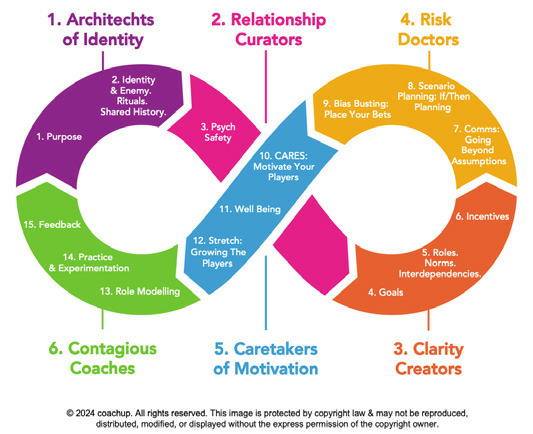Andrew Longley – Article 7 – Coaching with If-Then Planning
Andrew Longley – Article 7 – Coaching with If-Then Planning
Andy is a team performance expert with a background in psychology & applied neuroscience, who will over the coming months share insights ground the art and neuroscience of high-performance coaching. Each article will share a little of the latest applied neuroscience plus give simple tips on how to practically bring it to life in your own coaching.
Great to be back with you. In my Fifth article I introduced you to another part of the coachup model of high- performance teams and coaches, which you can see below. We looked at what makes a goal meaningful & how to create these for your athletes and teams.

The coachup.academy model of high-performing teams/coaches
Today, we’ll examine how to coach with If-Then Planning and why this is a key aspect of high-performance coaching.
We have already spent time in our previous articles exploring how our brains hate uncertainty and a lack of clarity, plus the resulting performance impacts of this. We know that when we experience uncertainty, we are abruptly and automatically pulled off the high-performance path into a threat state where we lose normal access to our rational thinking, decision-making, problem-solving, creativity and collaboration skills. One of the main techniques we have to avoid entering this threat state when the ‘unexpected’ occurs is If-Then Planning. If we can create less uncertainty when faced with different eventualities, then we can remain in a performance state when it really counts.
Now, let’s clarify what If-Then Planning is. It’s sometimes called scenario planning or implementation intentions if you’re familiar with those. It’s when we help to prepare for possible situations in the future by being explicit with what we will do should they arise. Some examples could be:
- Football: IF we lose our key player in the warm-up before our playoff match, THEN we will change our formation to 4-4-2 to be more solid against this specific opposition.
- Volleyball: IF the opposition sets up a double block on our strongest hitter, THEN we utilise quick
sets and back-row attacks to exploit gaps in their defence. - Basketball: IF the opposing team presses full court, THEN we use quick passing and dribbling to break the press and advance the ball up the court.
However, the If-Then Plans don’t need to be game-related and could include examples such as:
- Rugby: IF the behaviours when we’re on tour don’t
meet our agreed standards, and THEN our player’s leadership group will address these directly with the players themselves.
There’s also a fantastic example of how Michael Phelps used If-Then Planning leading up to becoming the most successful Olympian ever when he won his 10th gold medal. During the 2008 Beijing Olympics, Michael Phelps was competing in the 200-meter butterfly final when the worst possible thing happened: his goggles filled with water, leaving his vision impaired. However, despite the ‘unexpected’ obstacle, Phelps knew exactly what he needed to do and was able to maintain his composure and focus. Because he had trained using If-Then Planning, he knew exactly how many strokes each length took him, concentrated on that when he was unable to see and avoided panicking. He remained in a performance state.
As you can see, If-Then planning is about being prepared for different possible eventualities so that we know exactly what to do should they arise. The performance benefits are many and include:
- The ability to remain calmer leading up to a performance. This is because we strip out some of the potential worries for athletes.
- Increased athlete confidence. Like the previous point, when we have a plan in place for a specific scenario, we also boost our athletes’ confidence in handling adversity and remaining in a positive frame of mind.
- Enhanced decision-making. When we pre-prepare our decisions in advance, we also reduce the cognitive load on our athletes during the unexpected scenario. This leaves us with more cognitive resources for quality decision-making in other areas of our performance.
- Optimised skill execution. If-Then Planning enables our athletes to execute their skills and tactics more effectively because they have rehearsed specific responses to common scenarios. This means they can refine their technique and timing, leading to more precise and consistent performance when needed.
- The ability to remain in a performance state (and avoid a threat state due to uncertainty).
- The ability to move towards action faster because we don’t need to deliberate, gather information, or confer.
- Increased teamwork because we have the full team already aligned on what to do.
The benefits of If-Then Planning don’t end on the court, field, or track in the short term. As we explored in our last article, there are also long-term health benefits when we use If-Then Planning because we reduce the stress, anxiety and time spent in a threat state. This can lead to healthier weight management, balanced blood pressure, a stronger immune system, better memory and cognitive performance, and a more balanced mood.
So, coaching with If-Then Planning, when done well and consistently, can also support the athletes’ well-being!
So, there we have a little of the applied neuroscience behind coaching with If-Then Planning. We’ve seen both the short-term and long-term benefits, plus it’s such a simple technique to use and one that we can coach our athletes to use themselves in both sports and daily life.
The eighth article in this series will focus on why a high-performing coach must understand universal motivators and how to create a team environment that promotes optimal athlete and team motivation. Stay tuned.
Social Links:
www.coachup.academy
coachup’s IG: https://www.instagram.com/coachup.academy/
Andy’s LinkedIn: https://www.linkedin.com/in/andy-longley-psychio-and-coachup/
coachup’s LinkedIn: https://www.linkedin.com/company/coachup.academy/?viewAsMember=true